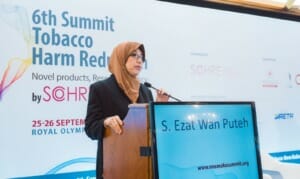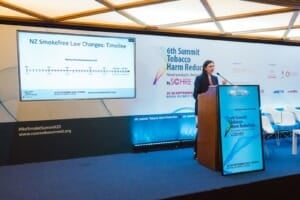The 6th Summit on Tobacco Harm Reduction (THR) was recently held in Athens, where speakers and experts from different parts of the world gathered to share new findings and updates. The Association of South-East Asian Nations (ASEAN), brought up the prevalence of tobacco product consumption in South-East Asia despite the availability of alternatives that are less harmful.

Professor Dr. Sharifa Ezat Wan Puteh, a trained Medical Doctor from UKM, presented evidence that many individuals in the ASEAN region started smoking at a young age.
Malaysia has the highest percentage (68.4%) of ever smokers who first smoked at the age of 7 to 14.
Youth are also not strangers to the usage of electronic nicotine delivery systems (ENDS), especially in Brunei, Indonesia, Malaysia and the Philippines.
With the increasing usage of harm-reduction products such as e-cigarettes and heated tobacco products (HTPs), regulation has become an issue that many countries have yet to solve. For example, the Philippines and Indonesia have made vaping legal while Singapore and Thailand have issued a complete ban on vape products. In Malaysia, nicotine liquids and gel are exempted from the Poison Act 1952, making vape liquid easily accessible to the general public over the counter.
In 2022, Malaysia’s Ministry of Health introduced the Control of Tobacco Product and Smoking Bill, also known as the Generational End Game. The bill will prohibit individuals born in 2007 and the subsequent years from smoking and buying any cigarettes or vape products even after the age of 18, if passed.

One of the largest concerns regarding the bill is the accessibility to tobacco and vape through other means despite the ban. According to Prof. Puteh, Malaysia is still one of the countries with the largest market for illicit cigarettes. On top of over half the cigarette consumption in the country being illicit, illegal vapes are also becoming a common occurrence. In 2021, Malaysia’s vape market size reached US $558 million.

“Education is number 1, not taxes,” said Dr. Marewa Glover, one of New Zealand’s leading tobacco researchers. In her keynote speech, she presented the updated legislative and regulatory changes in New Zealand, and said that misconceptions and barriers were part of the reason why smoking cessation is hard to achieve.
“We assume that everyone knows that smoking kills, but some people really don’t know,” said Dr. Glover. She adds that it’s important to help and educate those who lack the education because these are the ones who are more likely to be cynical and reject health risk messages.
Also read: We Attended The E-Cigarette Summit in London & Here Are the Key Findings M’sians Can Benefit From!









































